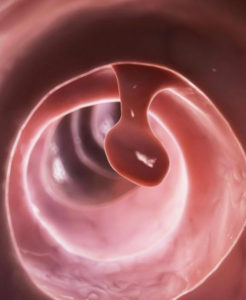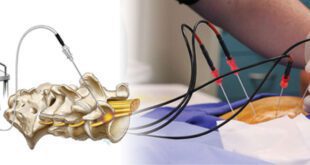 What are colon polyps?
What are colon polyps?
Polyps are growths involving the lining of the bowel. They are most commonly found in the colon. They can look like small bumps, they can grow on a “stalk” and look like mushrooms, or they can be flat and more difficult to find. Polyps can range from <5mm to several centimeters in size. Many patients have several polyps scattered in different parts of the colon.
Why are colon polyps significant?
Two-thirds of colon polyps have the potential to become cancerous. These are called adenomatous polyps, or adenomas. Most are small and do not develop into cancer. As a general rule, the larger the adenomatous polyp, the greater the chance that it will eventually become cancer. Some colon polyps do not have the potential to become cancerous. These are called hyperplastic polyps. However, differentiating between the types of polyp typically requires removal of the polyp and microscopic examination.
How common are colon polyps?
Polyps are common—they occur in 30 to 50 percent of adults.
What are risk factors for developing polyps?
The most significant risk factor for developing colon polyps is being older than 50. A family history of colon polyps or colon cancer also increases the risk of polyps. In addition, patients with a personal history of colon polyps or colon cancer are at increased risk of developing new polyps. Lifestyle risk factors include a high-fat diet, a diet high in red meat, a low-fiber diet, cigarette smoking, and obesity.
How can I tell if I have colon polyps?
Most polyps cause no symptoms. Larger ones can cause blood in the stool, but even they are typically asymptomatic. Colonoscopy is the best way to know if you have polyps because it allows the doctor to see the entire lining of the colon. During a colonoscopy, the doctor inserts a thin, flexible tube with a light and a camera at the tip through the anus and advances it through the entire length of the large intestine (colon). Using a variety of techniques, polyps that are found during this thorough examination can then be removed and collected through the colonoscope.
Do patients feel discomfort during a colonoscopy, and when polyps are removed?
Fortunately, no. Our patients are given twilight anesthesia and so are not awake for any part of the procedure. Polyp removal itself is not painful because the lining of the colon does not have the ability to sense pain.
When should I have a colonoscopy?
A colonoscopy is recommended for evaluation and removal of polyps for anyone age 50 and older who has not had a colonoscopy. It is recommended that this is done earlier if there is a significant family history of colorectal cancer or polyps. The number, size, and appearance under the microscope of any polyps removed then guide the doctor in recommending the timing for your next one.
Dr. Kaif, Board Certified Gastroenterologist and Hepatologist, Founder of Frontier Gastroenterology and Hepatology
Dr. Kaif specializes in digestive and liver disease and performs upper endoscopies and colonoscopies with the aforementioned interventions as necessary. He recently opened his practice in Trinity, FL and is accepting new patients.
Dr. Kaif grew up in the Pasco and Pinellas county area. He pursued training in Gastroenterology and Hepatology (digestive and liver diseases) at the University of Alabama at Birmingham, where the fiberoptic endoscope was first invented. Dr. Kaif then served as Assistant Professor at the University of South Florida from 2016-2018, where he pursued both clinical practice and education of gastroenterology fellows.
If you or someone you know needs agastrointestinal evaluation for prevention, diagnosis, or treatment, please contact Dr. Kaif’s office today.
Frontier Gastroenterology and Hepatology
8109 SR 54, Trinity, FL 34655
727-232-2462
Check Also
Hungry Heart
By Alex Anderson The songwriter and performer Bruce Springsteen was right when he wrote, “Everybody’s …
 Central Florida Health and Wellness Magazine Health and Wellness Articles of the Villages
Central Florida Health and Wellness Magazine Health and Wellness Articles of the Villages

